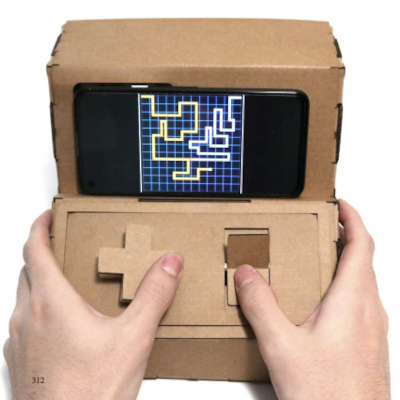| Tinycade Puts Cardboard And AI Into Games |
| Written by Lucy Black | |||
| Wednesday, 03 August 2022 | |||
|
We tend to underestimate how much AI is changing the way we can tackle problems - even problems that seem to have nothing to do with intelligence of any kind. Tinycade converts scrap cardboard into game controllers and it's a new way of thinking. AI is inverting the pyramid. It used to be the case that our software started with simple things and worked its way up to complex things. If you wanted to write a game then you, or most likely someone else, would first invent a game controller - a simple joyswitch, say, with four buttons, each designating a direction of movement. From there you would write some simple code to read which button was pressed and then you would work your way up the pyramid adding increasingly complex game play. Now the pyramid is inverted. You can now forget the simple four buttons and instead point a hugely sophisticated video camera at a target and use hugely sophisticated computer vision code to work out, according to what is seen, whether the user wants to move up,down, left or right. Your code from this point on gets amazingly simpler - say moving a dot on the screen and a couple of paddles. Tinycade didn't start out from this philosophical musing, but from Covid Lockdown boredom. Peter Gyory, a doctoral student at CU Boulder’s ATLAS Institute, spent the height of the COVID-19 pandemic sitting at home with nothing to do. Then the researcher, a game designer by training, noticed all the random materials he had lying around his house. “I was really frustrated that I couldn’t make games. Then I realized I was surrounded by cardboard. I thought: ‘How could I make a game out of that?’” Of course, as well as low-tech cardboard he had the miracle of the modern world - a smartphone. A smartphone, as we all know, is not really a phone, but a powerful computer that just happens to make the very occasional phone call. It has a display, a camera and a powerful processor. The challenge is working out how to use the camera to read the position of markers glued to cardboard working parts and how to make the software an easy interface to the computer vision system. Basically you need an intermediate layer to map marker positions to game like inputs. The cardboard problem is trickier in a different way because the camera is on the back of the phone - part of the solution is a mirror. Take a look at the results: Tinycade Overview trailer from Peter Gyory on Vimeo. At the moment the website seems to be incomplete so I can't tell you where to get the framework, but you can download a single game with a promise of more to come.
Tinycade made its debut at the 14th ACM conference on Creativity & Cognition held in June, 2022 in Venice, Italy and its two published papers are: Peter Gyory. 2022. Creating Platforms to Support Craft and Creativity in Game Controller Design. Peter Gyory, Perry Y Owens, Matthew Bethancourt, Amy Banic, Clement Zheng, Ellen Yi-Luen Do. 2022. “Build Your Own Arcade Machine with Tinycade,” In 14th ACM conference on Creativity & Cognition, (June 20-23, 2022—Venice, Italy). More InformationRelated ArticlesGoogle Paper Signals - The New UI? Successor To Cardboard Under Development Google AIY Cardboard And Raspberry Pi AI The Most Exciting Thing At Google I/O - A Piece Of Cardboard A 4-Bit Adder Made Of Cardboard! To be informed about new articles on I Programmer, sign up for our weekly newsletter, subscribe to the RSS feed and follow us on Twitter, Facebook or Linkedin.
Comments
or email your comment to: comments@i-programmer.info |
|||
| Last Updated ( Wednesday, 03 August 2022 ) |


